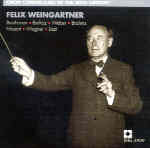Born in 1863, Felix Weingartner succeeded Mahler as head of the Vienna State Opera and enjoyed a three-decade-long relationship with the Vienna Philharmonic in addition to guest-conducting throughout Europe. This set reissues recordings made between 1936 and 1940, when the conductor was in his late 70s, an age belied by the performances’ vigor. His once-huge reputation seems faded today compared to that of more charismatic conductors of the 1920s and ’30s such as Toscanini, Furtwängler, Mengelberg, and Stokowski. But he was an influential conductor, a pioneer of “objective” interpretation whose recordings exhibit more than simple textual rectitude. While some of the selections here are available elsewhere (the Beethoven on Naxos, the Brahms on EMI), this two-for-one midprice release in the Great Conductors series should burnish Weingartner’s reputation and attract wider interest.
The 1938 Beethoven Second is notable for its momentum, rhythmic vitality, and balances achieved despite aged engineering. There’s a rightness to his tempos, as in the flowing Larghetto, and an attention to detail (the tingling sforzandos in the first movement, or the balancing of horns and violins at approximately nine minutes into the Larghetto) that still yield huge listening rewards. The symphony is preceded by an equally vigorous Prometheus Overture. In the Brahms Third, Weingartner delivers one of the more convincing recorded performances of an often elusive symphony, largely because of his natural transitions and the way he clarifies the work’s structure without undue underlining.
With Mozart, we hear an approach whose momentum is tempered by Weingartner’s elegant phrasing and traditional Viennese orchestral sonorities. Two Wagner pieces illustrate his rejection of what he derided as the exaggerated “Bayreuth tempo”. Rienzi, often played as an exercise in blustering bravado, is more effective in Weingartner’s sane but animated interpretation, and his Siegfried Idyll has a simple dignity that avoids stodginess. A similar approach marks his Liszt: in Les Preludes he maintains excitement without “Lisztian” hysteria and gives full due to the lyric sections, as he also does in the first Mephisto Waltz. The Berlioz and Weber works make a lesser effect; in the latter his own orchestration is less interesting than Berlioz’s more familiar one, and the former really needs modern engineering if it’s not to sound like a dusty antique.
The sound throughout the set occupies a narrow quality band that ranges from inferior (Rienzi) to fair (most of the rest). Sound reproduction in the late 1930s left a lot to be desired, but there’s plenty of recorded evidence to indicate that the norm was several notches above what Weingartner was given.
































